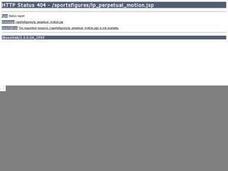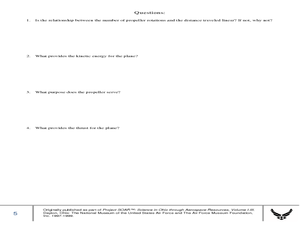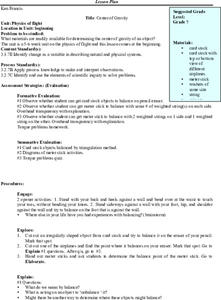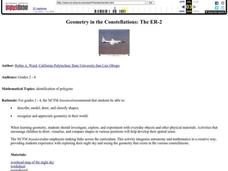Curated OER
A DISAPPEARING ACT Astronomy: Do Stars Always Shine?
Students observe why stars are not visible during the day with a classroom demonstration using an index card punched with holes.
Curated OER
Perpetual Motion
Middle schoolers discuss movement of air currents and then experiment to create visible models of air currents. Students connect the model to weather patterns.
Curated OER
The Reason for the Seasons; Science, Geography
Learners think about what causes the seasons to change, reflect on what they know about seasons and how their lives affected by seasonal changes.
Curated OER
WHAT HOLDS US TO EARTH?
Students they imagine they are Galileo and try to duplicate Galileo's experiments and results.
Curated OER
PROBLEMS/SOLUTIONS
Students choose an interesting problem related to space travel and then design a plan to solve the problem. They present their solution to the class.
Curated OER
Stargazing Astronomy: A Ceiling Full of Stars
Learners make an observe a planetarium using a can with nail holes, black paper and a flashlight.
Curated OER
Transportation
Students explore basic transportation vehicles, specifically air, land, and water vehicles, name six different modes of transportation, identify four different kinds of train cars, and three differences between two different modes of...
Curated OER
Propellers, Forces and Energy
Students construct a model airplane, measure distance, and calculate velocity. In this creative lesson students work in groups to build a model and use it to calculate distances and velocity.
Curated OER
Center of Gravity
Seventh graders determine the center of gravity of an object. They get card stock objects to balance on pencil eraser and a meter stick to balance with same # of weighted string(s) on each side. They get meter stick to balance with...
Curated OER
Bernoulli's Principle: Wind and Wings
Students investigate Bernoulli's aeronautical discoveries. Working in groups they conduct simple experiments with paper that demonstrate how airplane wings work and how they are affected by air pressure.
Curated OER
Letters to the Man in the Moon
Students write and communicate mathematically with their classmates. They discuss the mathematics that it took to allow us to conquer space and land on the moon. They sketch a plaque they would leave on the moon.
Curated OER
Algebra, Multiplication, and Division of Fractions
Students gain knowledge by measuring time and distance for solving unknowns in an equation. They also will design an airplane and chance to communicate mathematically by writing essays.
Curated OER
Airports
Students respond to movement cues while maintaining their balance. In this movement and balance lesson, students gain understanding of general self space concepts while imagining themselves as an airplane. Students respond to high,...
Curated OER
A Real-Life Application of Ratio
Students discuss the concept of "aspect ratio" of the Helios Prototype. They find real life objects that are taller or shorter than them by a certain amount. They practice with ratio and measurement.
Curated OER
Geometry in the Constellations: The ER-2
Students discuss reasons to record the location of stars. They view a picture of the night sky, and discuss constellations. Students complete a worksheet of the various shapes they see in the constellations.
Curated OER
Sonic Booms and Logarithms
Students practice working with the symbolic notation for logarithms. They understand various types of patterns and functional relationships. They use symbolic forms to represent and analyze mathematical situations.
Curated OER
NASA Glenn Research Center Mission : High-Speed Civil Transport (HSCT)
Students use World Wide Web resources to identify the problems and advantages of high-speed transportation. They download files and graphics and incorporate them into a word processed report.
Curated OER
The X-33 and the X-38
Pupils explore the relationships among the lengths, areas, and volumes of similar solids. They also discover what effect doubling the dimensions of a figure has on the resulting area.
Smithsonian Institution
Smithsonian Learning Lab: Airplanes and Airports: How to Take Off Without Ever Leaving the Ground
Smithsonian Education presents "Airplanes and Airports: How to Take Off Without Ever Leaving the Ground." Teachers can download this teaching package that discusses airplanes and airports. Included in the discussion are the forces of...
Smithsonian Institution
Smithsonian Learning Lab: How Things Fly: Activities for Teaching Flight
Through this series of three lessons, learners will gain an understanding of the basics of flight. They will learn about the four forces of flight and practice their observation skills through a number of fun experiments. In addition,...
Science Education Resource Center at Carleton College
Serc: Investigating Flight With Paper Airplanes
Students will experiment with different styles of paper airplanes, create questions to test, and design experiments that will allow them to gather data related to their question. They will record their data, using graphs where...
University Corporation for Atmospheric Research
Ucar: Learn to Fly! Uav First Flight
Students begin to learn basics of flying UAVs/drones. This simple initial flight includes a take-off, hovering at different heights, and landing.
Science Education Resource Center at Carleton College
Serc: Designing Fast and Slow Airplanes and Measuring Velocity
In this activity, students design their own airplanes and fly them. The challenge is to create a fast plane and a slow plane and compare the speed to the design.
TeachEngineering
Teach Engineering: What Makes Airplanes Fly?
Students begin to explore the idea of a force. To further their understanding of drag, gravity and weight, they conduct activities that model the behavior of parachutes and helicopters. An associated literacy activity engages the class...























